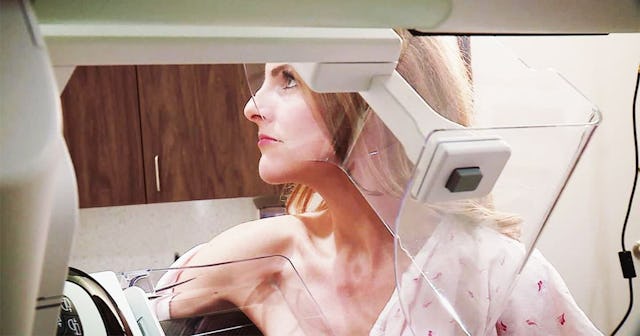Reporter Diagnosed With Breast Cancer After Live-Streaming Her First Mammogram

When Ali Meyer live-streamed her first mammogram, a breast cancer diagnosis was not what she was planning to receive
A year ago, at the age of 40, local Oklahoma City news reporter Ali Meyer decided to live-stream her first ever mammogram on Facebook. The mother-of-four and Emmy-award winning journalist’s greatest hope was to raise breast cancer awareness with her followers, encouraging them to schedule their own screenings. What she didn’t realize was that she would be sharing her breast cancer diagnosis with all of them.
“I had no concerns; no lumps; no family history; no reason at all to think that my baseline mammogram would turn my world upside down,” she told Oklahoma’s News 4 on October 29. “I was hoping for a routine mammogram, but that’s not how it went.”
Meyer’s radiologist, Dr. Richard Falk, discovered cancerous calcifications in her right breast. They turned out to be non-invasive ductal breast cancer — a very early stage of cancer that is easily treated. Doctors also conducted genetic testing, which showed that she didn’t have any genetic mutations such as BRCA. “I wish I could say that made it a little easier, but it just didn’t. I was crushed,” she revealed.
“I will never forget that day. I will never forget telling my husband and my girls after they got off the bus that afternoon,” she continued. “Then, I decided to share my diagnosis on Facebook.
Despite the fact that non-invasive ductal breast cancer (DCIS) is one of the most survivable forms of breast cancer, there was a catch: After interviewing multiple surgeons, she realized that she needed to remove her entire right breast to get all the cancer. “I was devastated about that recommendation,” she says.
Two months after her mammogram, she walked in for her “right side, skin sparing, nipple sparing mastectomy.”
“Even though surgery was my choice, it felt like forced mutilation,” she said. “It felt like cancer was stealing part of my body away from me.”
Ali maintains that getting a mammogram when she did saved her life. “My surgical options, my recovery and my outcome were all better because my mammogram found the cancer before I even knew it was there,” she said.
Ever since her diagnosis, she has been documenting her journey on social media. It is all sorts of informative, inspiring, and motivating.
“I will never stop having mammograms. I will never stop telling women to take care of their bodies and schedule their mammogram.”
Remember, most people don’t think they are going to get cancer. Even if you have no family history of breast cancer and you don’t carry the gene, you can still get it. For example, while your chances of getting breast cancer double if your mother or grandmother had it, less than 15 percent of those diagnosed with breast cancer have a family member who also had it.
As Meyer urges, stay on top of your mammograms and breast cancer screenings. It could very well save your life.